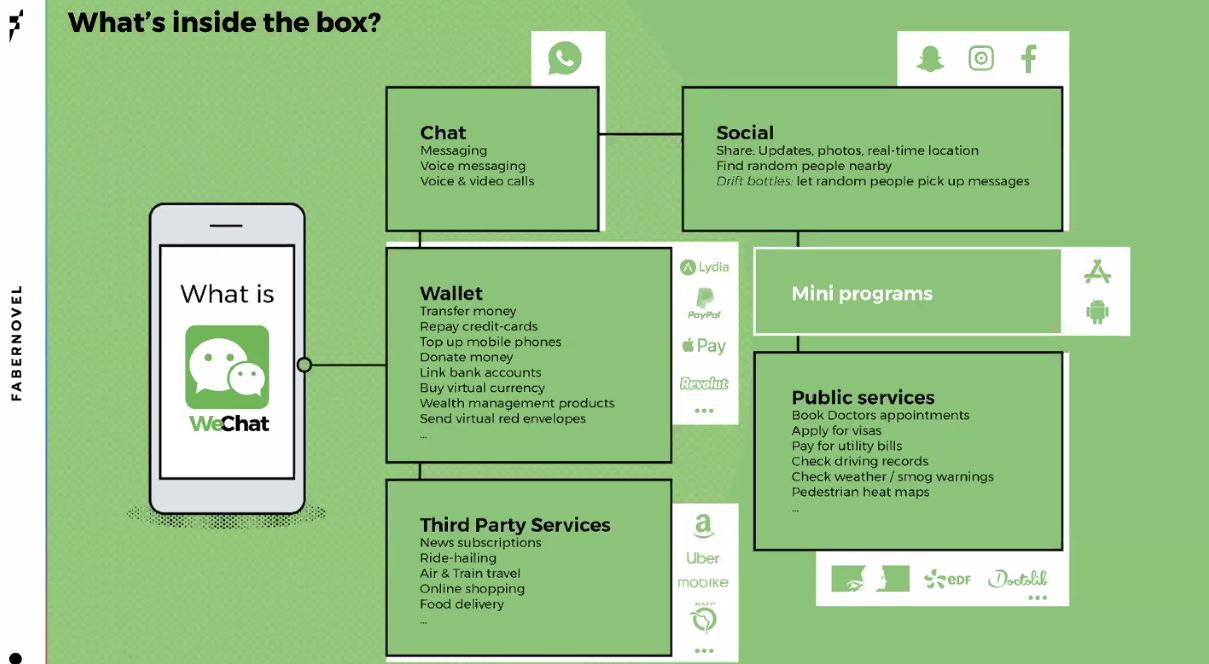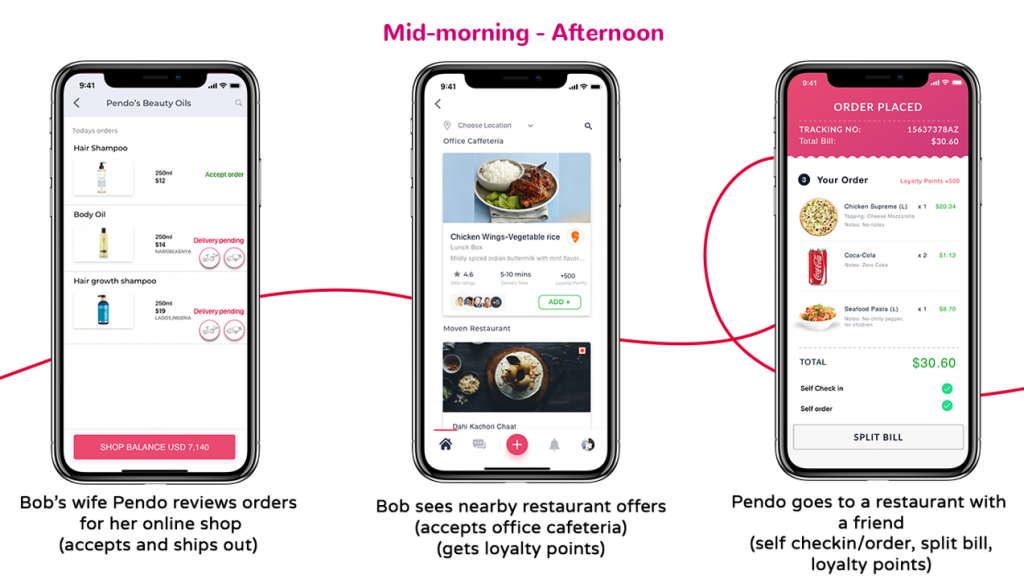Innovation in China with Fabernovel
Katherine Wang is Project Director at Fabernovel in Shangai, China. I thought her presentation at the Fabernovel MultipLX #42 ‘Uncovering the Weibo ecosystem’ was truly eye-catching! So I asked her if she wouldn’t mind answer a few questions about Innovation in China.

1) Hi Katherine, can you tell us about your profile, professional path, and current role at Fabernovel?
I’m originally from China. After my studies at University of California, Berkeley, I got into digital marketing, and developed expertise in the China digital ecosystem.


During my five years with Fabernovel, I slowly shifted from digital marketing into digital training, and innovation consulting in both our Shanghai and San Francisco offices. Currently I’m a Project Director, in charge of both large and small scale digital transformation and innovation projects for our key corporate clients.

2) Startups ecosystem is vivid in China: Luuk Eliens, Head of Innovation at XNode (helping multinationals to connect with Chinese startups) considers in this article that 12 to 15,000 companies are created every day!!! Government incentives, unparalleled access to engineers, risk-takers mindset are some ingredients for this success. What is your personal analysis of these enablers?
The government plays a crucial role in the development of Chinese startups. There are several layers of this.
- First of all, China has a closed ecosystem, which allows Chinese companies to develop their own services to meet the demands with not much competition from foreign rivals, prime examples being Facebook/Instagram/Whatsapp versus Wechat, Twitter versus Weibo;
- Secondly, Chinese government has been promoting their strategic plan “Made in China 2025†since 2015 with the focus on technological innovation. Innovation funds, incubators, tax rebates are all fueling the growth of startups in China.;
- Thirdly, investors are vigilant of government policies and investing accordingly, which allows money to be poured into sectors favored by the government.
On the other hand, the abundance of talents are key for a successful startup ecosystem in China. When you look at Silicon Valley, you often see tech companies’ sponsorships of work visas provided to foreign talents. In fact, 71% of tech workers in Silicon Valley are foreign born. But in China, because of the large population and the advancement of education in general, it’s always an employers market. Companies get to pick the top performers in nearly every industry.

3) Regarding innovation culture and entrepreneurial mindset, Luuk points out that ‘there is less emphasis on long-term vision and strategy as you’d find in the US or Europe – and more focus on… well… not focusing.’ Is this your feeling too? Are there other patterns that strike you (like a pragmatic, ‘wait and see attitude, where rationality takes a backseat to opportunism’)?
As you mentioned in the last question, risk-taker mindset is definitely essential to nurturing innovation and an entrepreneurial culture. Because the China market is huge, it’s easy to deduce that whatever business you’re creating, as long as it makes sense, the potential would be huge. Companies want to become the biggest player before anyone else does, so that they can dominate the market sector.
Some companies, such as Ofo (bike sharing service), tried to scale up too quickly, and collapsed fairly quickly. Companies need to really strategize smartly, to create a business model that not only excites people (including investors), but also is solid and sustainable in the long run.
The pursuit of fast growth can be distracting (editor’s note: fast growth reminded me of Blitzscaling). A common strategy from Chinese companies to get market share is through incentives, such as coupons and discounts. Instead of focusing on developing a strong product with clear competitive advantages, a lot of companies fixate on garnering more money from investors and burning the cash to attract more customers. This often led to bankruptcy of startups.

Another notable point is that when you talk to startups in the U.S., everyone has an amazing story and an inspiring mission statement. I think it’s lacking in a lot of Chinese startups. Chinese companies are more pragmatic in general, immediate results are often appreciated. But at the same time a lot of them don’t have a long term vision, or it’s only on the founders’ mind and not communicated well company-wide.
4) Another Chinese realm is the one of the Super Apps. Fabernovel presented brilliantly the case studies of Alipay and Wechat (MultipLX #2), and the dominance of mobile payment from peer to peer transfer, to C2C commerce, paying taxi rides, street singers (with QR code), vending machines, or gamification. Do you believe this hit can be replicated in Europe?
Let’s take a step back. Culturally, Chinese people are very quick in terms of embracing new technologies, in exchange for convenience. This is drastically different from, say, Europeans, who are largely skeptical about adopting new technologies, probably with huge concerns about privacy issues. Mobile payment is a prime example. QR code was nothing new for the Westerners. But with WeChat and Alipay, China has become a cashless society.Â
Let’s take WeChat for an example. At the beginning, people were incentivized to use WeChat Pay. But it wasn’t enough to make people abandon their wallets. As discussed in our study, WeChat engaged customers to bind their bank cards with WeChat in a very smart way - leveraging the cultural tradition of giving red envelopes to relatives, and made it virtual.
Also, WeChat always puts the customer at the center, following a jobs-to-be-done framework. It doesn’t try to keep people on the app. It helps you to finish all the tasks and then leave the app, which is drastically different from apps like Facebook. WeChat built this whole ecosystem to allow users to accomplish as many tasks as possible, within one app. This also means that WeChat has an enormous amount of data on its users. When you think about having a similar type of app in the U.S. or Europe, it’s very hard to imagine people will appreciate the idea because of privacy and data issues.

I don’t think that the phenomenon will be replicated, but I do think that the U.S. and Europe will develop their own version of this that addresses their target users’ challenges. For example, the newly released App Clips share a lot of common traits with WeChat’s mini programs.
5) What about replicating this adoption of Super Apps in Africa (international expansion is on its way in India with a massive acquisition of mobile payment provider)?Â
As I mentioned, localization of apps are essential for winning a new market. In other words, new technologies have to be culturally compatible, and in the meantime help to solve the target users’ problems. Replication alone wouldn’t work.
At the same time, everyone’s looking at Africa. It has the huge economic potential, and a large population as China does. As the economy grows, new needs for technology emerge. How to bring sustaining value to people that are specific to the region? How to educate the market? How to build a strong local ecosystem through partnerships? These are the questions that have to be answered before going into the market.



NEVER MISS ANOTHER NEWSLETTER!
LATEST BLOGS
Credit Card Shenanigans
It must be great to be in the credit card business in the United States. Demand is relatively inelastic and regulation is lax, so you can charge whatever you want for an interest rate, increase your fees once or twice a year, and make additional money off cash withdrawals and foreign exchange transactions.
Read MoreBuilding an Experience
As people become ever more immune to traditional advertising and marketing, branding will become more important. Branding is all about building an emotional connection with customers. Making the decision to follow a strategy focused on building a brand is not without peril, however, as it means that you will have to choose to not do certain things, like pursue a low price strategy.
Read More- « Previous
- 1
- …
- 4,132
- 4,133
- 4,134



